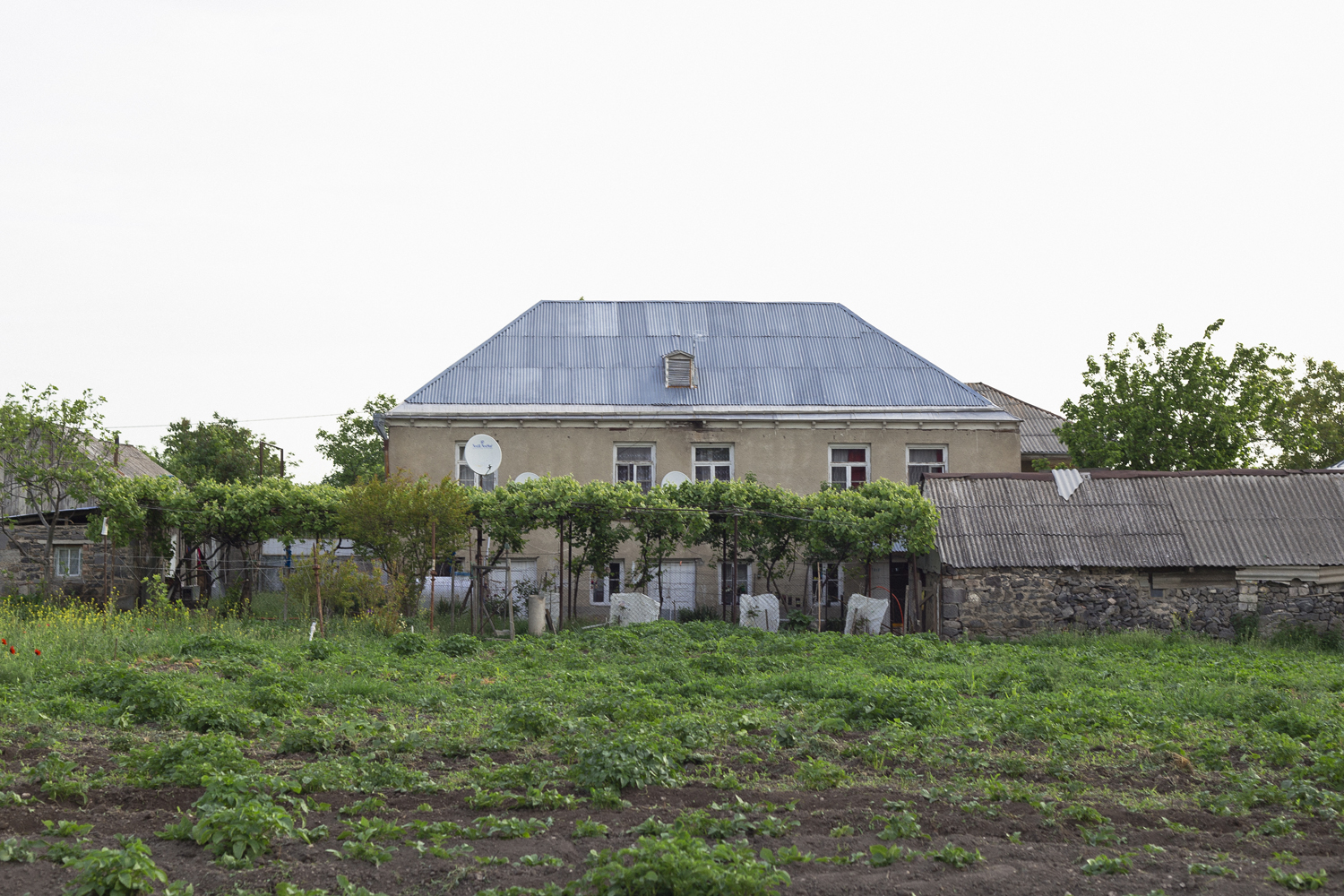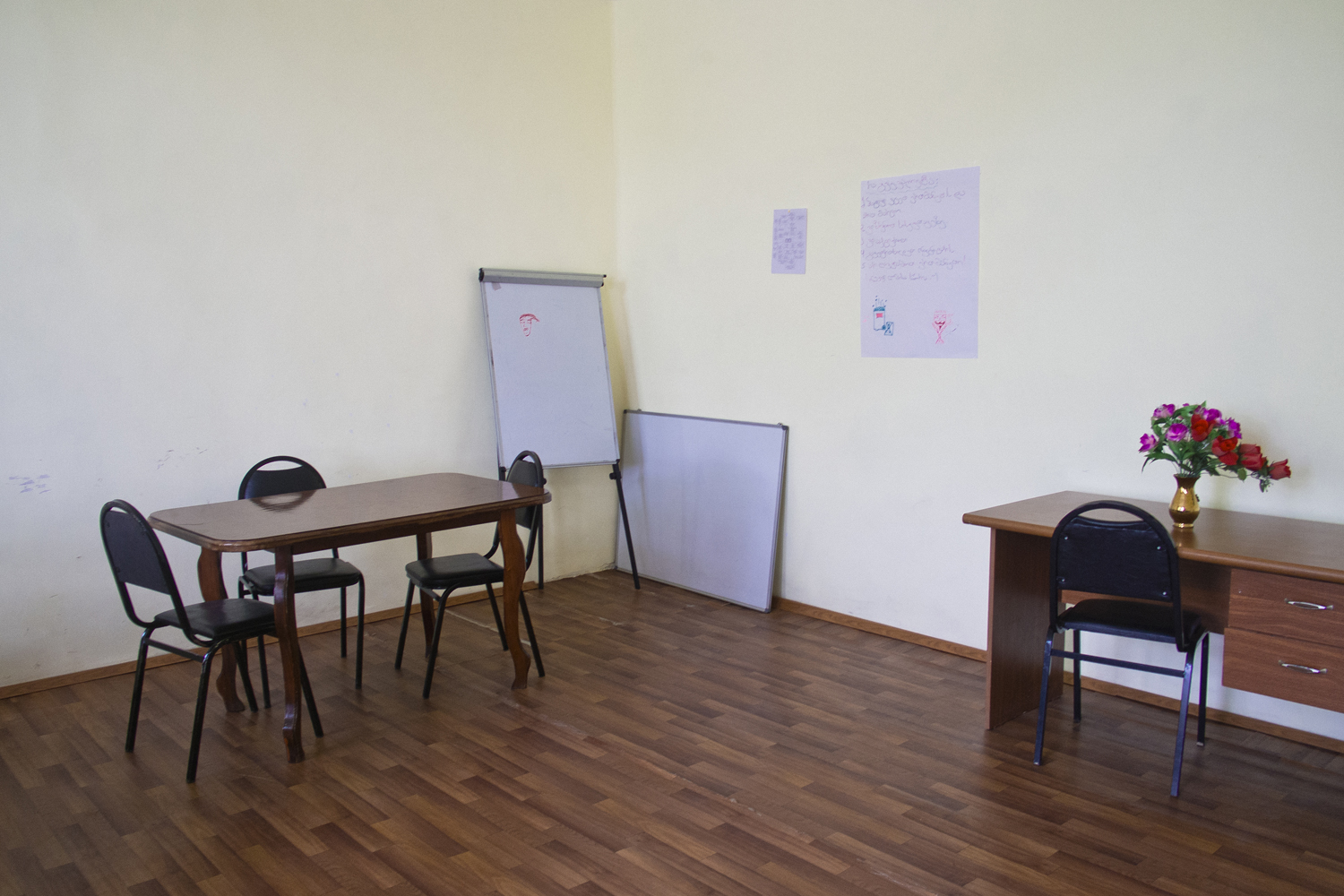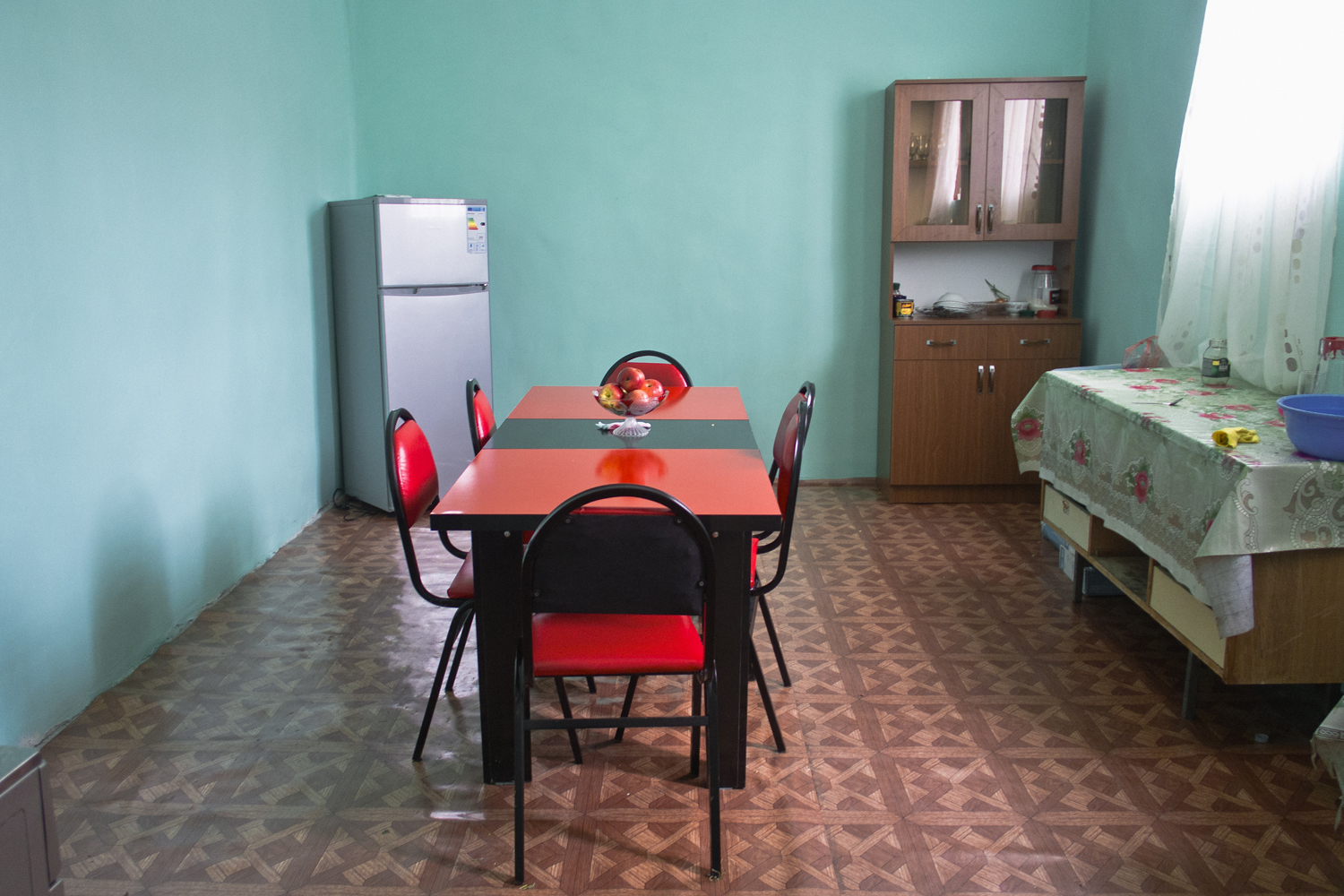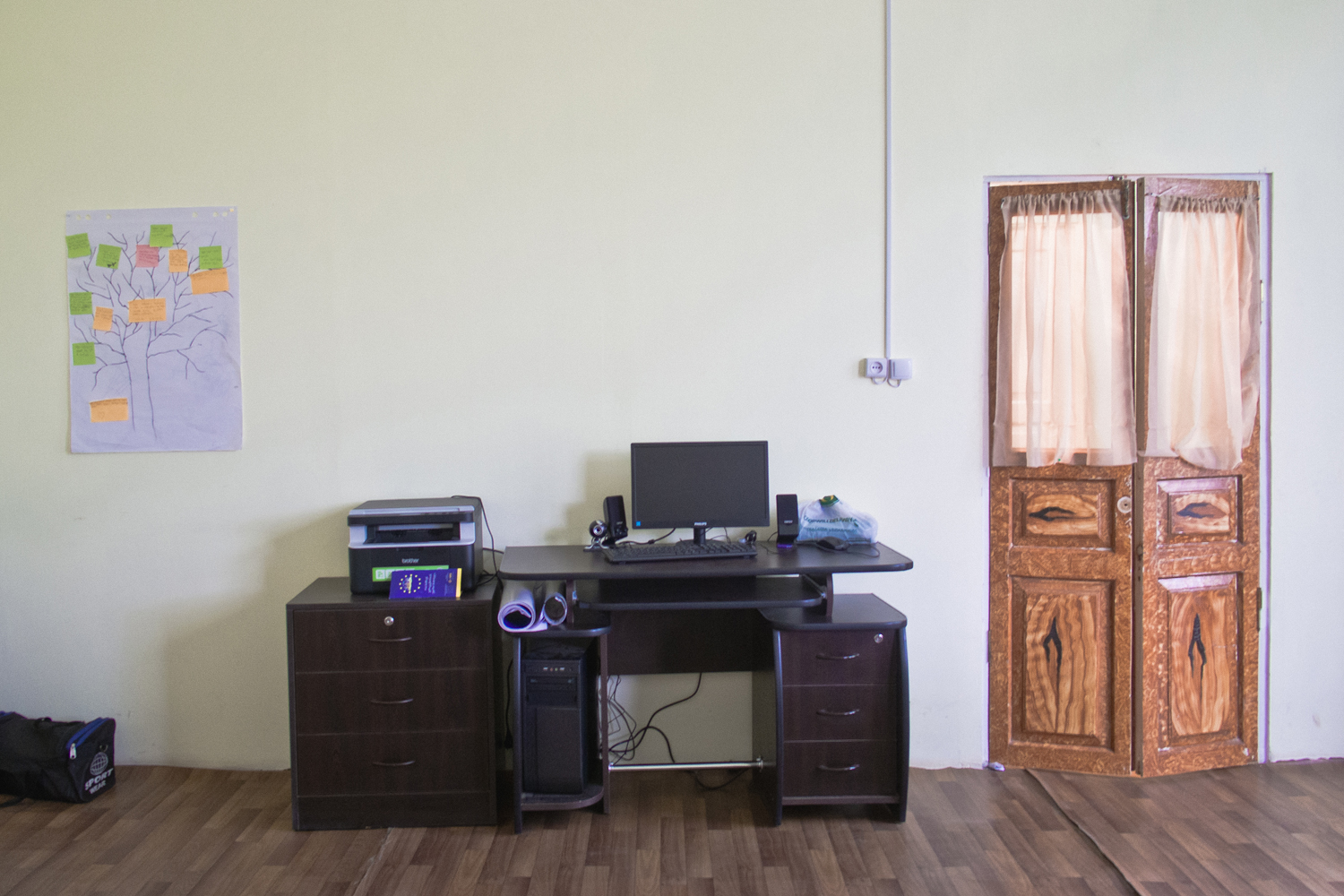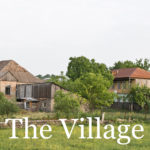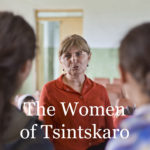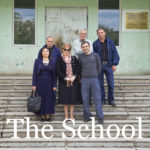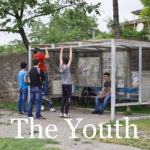Project Description
„It’s really hard to be an IDP (= internally displaced person) in your own country and to have your house so close, but not being able to return to it“, says Eleonora Gurchiani, one of the three women who are trying to make their new home Tsintskaro a better place for themselves, but especially for the entire community. Together with Neli Ansiani and her former classmate Tsiuri Ansiani and many other deeply committed women (and men), Nora, as everybody calls her, created multiple self-aid groups, who work on a variety of projects. Together with different organizations they are trying to improve the current living conditions of the villagers.
Nora Gurchiani about her life in Abkhazia
Nora is the eldest out of seven children. Together with her two brothers and four sisters, she grew up in the Kodori-Region in Upper Abkhazia. „Both of my parents families were honest and hard-working people“, she says. The families grew their own vegetables and „just like in heaven’s garden, they harvested the best kind of fruits“, she explains. Whatever they harvested, was natural and the most important thing was, that there was always enough food for everyone. „As a family with seven children, we were very rich. It’s not that we had a lot of gold jewelry or money buried somewhere, we just had enough, natural, clean food and we had everything we needed“, she adds. All this was not about storing huge amounts of food, but about providing a good living standard. — „Our family was like a fussing bee. All of us did some kind of work from childhood on. Everyone did what they could.“
When Nora was older, she moved to Abkhazia’s capital Sukhumi, which is located on the Black Sea coast. There, she learned accounting and started working, but always stayed in close contact with her family. She visited her native village a few times a month and always supported her family.
„Even if there’s nothing, it’s absolutely possible to start from zero.
If you fight, you’ll accomplish and achieve.“ — Nora Gurchiani
On the 8th of August 2008 Nora’s home village Gencvishi (located in the Gulribshi Municipalty in Upper Abkhazia) was bombed and on the 9th of August, the 55 year old, as well as her family and the entire villagers, had to flee. The Russo-Georgian War made Nora’s family and many other families from the Kodori-Region in Upper Abkhazia (northwestern part of Georgia) IDP’s for the second time in their lives. — During the War in Abkhazia from 1992 to 1993, Nora’s native region was bombed and the whole family had to flee to Kutaisi, the capital of the Imereti Region. „I remember the years we spent in Kutaisi as the most difficult ones“, Nora says. Back then, while all women, Children and elder people people left to find shelter somewhere else, the men stated in the villages.
Still, Nora managed to travel between Kutaisi and the war region. „I worked there as much as I could, then came back to the city with my harvest“, she says. „I brought back whatever my brothers and father needed in the valley. — I was one of the very few people who could actively travel back and forth to the valley“, she adds. — So in the early 90’s, the region already experienced the horrors of war and not even two decades later, the terror began again. For a second time, after having rebuild everything from basically nothing, when the war in 2008 started, the families from the Kodori-Region had to leave all their belonging behind again.
The first year after their second escape from Abkhazia, the families had to live in dire conditions in school buildings without water supply or electricity, in an unheated police station or in university facilities in the center of Georgias capital Tbilisi. — But this didn’t make Nora and the other woman give up on life; it made them even stronger. „Somehow, during the double exile we realized that we had to fight. Because we survived, we had to strive“, Nora says.
Nora about her Escape from Abkhazia.
After the rough and challenging time in Tbilisi, the Ministry of IDP finally offered the families either money to buy houses on their own, or houses in the village Tsintskaro, while only a few families received houses in Tbilisi.
Neither really knowing how Tsintskaro looked like, nor knowing about the conditions of the houses, most of the families agreed to the offering of the ministry. Luckily Nora had the chance to visit Tsintskaro a few times beforehand, but still says, that „it was very difficult for (…[her and the other families,]) to make a decision.“ — Evenually 29 houses were bought at the time the ministry settled the IDP’s and from February 3rd 2009 on, the first three families lived in Tsintskaro; these were Nora’s family, the one of her brothers and another family, which were not relatives.
Tsiuri about her Escape from Abkhazia.
The Arrival
Arrived in Tsintskaro, the new arrivals were greeted nicely by the local inhabitants. They people helped the families sweeping and cleaning the houses, because the IDP’s didn’t have any domestic appliances at all, so they were very grateful for all the help they received. — They people of Tsintskaro allowed the IDP-children to sleep over at their places, they gave them food, bathed them and gave them a save place to stay overnight, which is a great example of the Georgian hospitality.
In Georgian, there is a word called „kutkhe“, which basically means „region“, but the literal translation is „corner“. All regions in Georgia can be compared with corners (= rooms) in one big house. Everyone has his or her own room in a house, your comfort zone, and by letting the IDP-children into their houses, they shared their comfort zone. Tsintskaro’s inhabitants let people from other regions/corners of the country into their homes, to give them shelter. — The moral of this story is, that even if a country is divided into regions/corners, it is still like living in the same big house, so in times of need, the people came together and helped each other, just like a family uniting in the living room.
Neli about her life in Tsintskaro.
The House of Nora and her her family in Tsintskaro.
Taso Foundation
Because of all the problems and inconveniences the IDP’s were facing after their arrival (see „Ways of Subsistence“ in the chapter „The Village“), the women quickly realized, that the only ones who could change their own living situation, are the women themselves. Because of that, they were looking for a way to find help and finally, Neli Ansiani was the one who got in contact with the Taso Foundation in the first place. She found out about the organization through other conflict affected people, who the organization was working with before, and when she went to meet the representatives at the office in the center of Tbilisi, she told them about the living conditions of the new arrivals and soon after that, a meeting was organized and the representatives, meaning Marina Tabukashvili, the director of the organization, and two of her co-workers, came in Tsintskaro.
“What we are working on, is the process of social community mobilization
of conflict affected and internally displaced people, which doesn’t mean working for the IDP’s,
but working together with them.“ — Marina Tabukashvili
Taso Foundation is a non-governmental organization working on many different problems in several sights of Georgian. The organization itself was founded in 1998, as a women program of the Open Society Georgia Foundation, and since 2004 intensively focusses on the work with women in rural areas (especially IDP-women), as Marina Tabukashvili explains.
The main problem for the people in rural areas like Tsintskaro, which is a global problem in remote areas all over the world, is the lack of participation and access to services, as well as the lack of efforts put into the development of these areas by the government itself. — Unfortunately the already negatively affected minority populations suffer the most.
The organizations uses different strategically important work directions, to help people helping themselves. On the very first meeting, which about 40 to 50 people, both IDP’s and non-IPD-residents attended Taso Foundation’s representatives talked about the organization itself, their current work and the previous projects they did. Marina Tabukashvili then explained to the audience, that „social mobilization methodology is absolutely necessary“ for the villagers. It is not the organization’s goal to simply distribute money, but rather aiming to make the community work together on their problems, with the support of the organization. — The keyword here was taking the law into their own hands.
Very soon, the people realized, that Taso Foundation could provide exactly the kind of help and support the village needed and on that day, agreement about the voluntary participation of the people were made. — „This was the necessary first step, because the people of a society, affected by conflicts and wars, mostly identify themselves as only member of a list for the distribution of money and nothing more. The distribution is needed in the first time after a conflict, but then, everyone has to recognize that in difficult times, you have to think and act differently, and change something in your own mind, to finally see yourself as an agent of change.“
What makes Tsintskaro a special sight for the Taso Foundation is also, that (apart from the IDP’s from Abkhazia), eco-migrants are settled here, as well, which are, in Marina Tabukashvili’s words „a really vulnerable group, as there are only very few programs for them“, so luckily now, they benefit from the help and assistance in Tsintskaro as well.
Marina Tabukashvili (second from the left) and Nina Ugrekhelidze (on the right) with two other colleagues from Taso Foundation.
The organizations uses different strategically important work directions, to help people helping themselves. On the very first meeting, which about 40 to 50 people, both IDP’s and non-IPD-residents attended Taso Foundation’s representatives talked about the organization itself, their current work and the previous projects they did. Marina Tabukashvili then explained to the audience, that „social mobilization methodology is absolutely necessary“ for the villagers. It is not the organization’s goal to simply distribute money, but rather aiming to make the community work together on their problems, with the support of the organization. — The keyword here was taking the law into their own hands.
Very soon, the people realized, that Taso Foundation could provide exactly the kind of help and support the village needed and on that day, agreement about the voluntary participation of the people were made. — „This was the necessary first step, because the people of a society, affected by conflicts and wars, mostly identify themselves as only member of a list for the distribution of money and nothing more. The distribution is needed in the first time after a conflict, but then, everyone has to recognize that in difficult times, you have to think and act differently, and change something in your own mind, to finally see yourself as an agent of change.“
What makes Tsintskaro a special sight for the Taso Foundation is also, that (apart from the IDP’s from Abkhazia), eco-migrants are settled here, as well, which are, in Marina Tabukashvili’s words „a really vulnerable group, as there are only very few programs for them“, so luckily now, they benefit from the help and assistance in Tsintskaro as well.
Self-Aid Groups — Projects — Applications
With the help of Taso Foundation, the people of Tsintskaro discussed different community problems and started to form their first self-aid groups, with Neli Ansiani as their group leader; quickly after that, Nora became the leader of a second group. First and foremost, Taso Foundation taught the women how to write protocols and applications about the problems that should be approach, as well as how to calculate things etc. „Then, we gave the community grants; grants for economic activism, but most importantly grant for social activism, because that is what moves a society forwards; that is something that the whole community benefits from it’s a process“, Marina Tabukashvili explains. — Topics like women’s rights and domestic violence have been addressed, as well.
„You can’t solve everything, you can’t reach everything,
but when you know how to correctly use the information you have
and are able to find the right contact person, to talk about your problems or issues,
then nothing is impossible.“ — Nora Gurchiani
One of the first projects back in 2001 was about bio-farming, that Taso Foundation already offered to community in different sights of the country. Therefore the organization cooperated with experts in organic-farming who provided the trainings. Unfortunately, by that time, and the organization only had a small amount of money from Open Society Foundation New York, that was given to the people in Tsintskaro. — Because the organic-farming is quiet easy, very profitable and showed good results, it was an example for many people from other regions, so that Taso Foundation got many proposals for bio-farming since 2012.
Soon, multiple self-aid groups were formed and started working together, to improve the living conditions of the villagers. „I was the head of one group“, Tsiuri Devdariani says. „But it wasn’t really about one person, it was about the collaboration, because we are depending on each other in a group project“, she explains, and when the project supervisor from Tbilisi came and asked her, how she managed to do such work, all she could say was, that they did all the work „together, like one team.“ — Also people from other villages in the area joined, several smaller groups emerged and worked (and still work) separately, but also together on many different projects. — One of many other important projects (not all with the help or Taso Foundation) was about purchasing computers, another one about building a suing salon and after that, a beauty salon, which is still running today.
Still, Taso Foundation was one of the most important Organizations for the people in Tsintskaro, as they financed numerous projects, from the above mentioned mini grants for organic farming, right up to financial support for buying books, toys and outdoor equipment for the kindergarten. — „We also have a bakery, thanks to the help of Taso foundation“, Neli says, and apart from that, Taso Foundation was involved in providing the equipment of the gym room, where wrestling training takes place.
Since 2012 seven small projects and mini grants were accomplished in Tsintskaro. After being the leader of one self-aid group, Nora became a community worker. She unites and guides the groups and helps them to get in touch with different non-governmental organizations an authorities.
Kodori 2013 — Community Center
In 2013, 4 years after arriving in Tsintskaro, the women created their own foundation called Kodori 2013. Since then, the organization has issued three small grants. „Our first own project was endowing the music/sining class with 1400 Lari (approximately 550€/600$) to buy musical instruments“, Nora explains. — The biggest project Kodori 2013 worked on until today, was the community center.
After several smaller projects, the women of Tsintskaro united five organizations and institutions to get financial help. „We received help from Caritas Georgia and Caritas Romania, the Kodori Municipality, Taso Foundation and UN Women“, Nora explains. The goal was, to convince the organization of the necessity of this facility for the village and they financed the renovation of the center. „When we bought the house and renovated it, it was beneficial for the whole community. We couldn’t really imagine it, a dream came true. We didn’t even have our own houses and the fact that we fought for this shared house and finally implementing it, made us really happy“, Nora says. „Among others, we got photocopiers and library books; kids are coming here every day, they borrow the books and practice singing here“, she amplifies. — Then the women wrote a project about the renovation of the building. Furniture and other equipment were financed by the Taso Foundation, the kitchen facilities were financed by Caritas.
Facilities of the Community Center.
The office of Kodori 2013 is the heart of the village and has a lot of visitors throughout the day. It has many functions for the villagers: it’s a gathering place, a working space and a training center. It connects people and non-governmental, as well as governmental organizations during conversations, trainings and (business) meetings for new ideas and projects, and therefore, a very important facility has been established in Tsintskaro.
Apart from a meeting space for daily activities and meetings, it can be used as a shelter. Therefore the organizations purchased inflatable mattresses and kitchen appliances for about 40 to 50 people.
For the future of Tsintskaro itself and the future of the work between Taso Foundation and the villagers, it is Marina Tabukashvili’s approach to sustain and further develop the already achieved results. Moreover she says, that „Kodori 2013 is such a remarkable partner, and it is absolutely possible, that they will one day decide to invite us to one of their one great programs and ask for partnership.“
Governmental Help
A huge problem of the IDP’s used to be, els still is the insufficient help they receive from the government of Georgia. The small monthly aid of 45 Lari a (approximately 17€/19$) is unfortunately not enough to sustain the previous lifestyle, and doesn’t even cover the basic needs of the families. In Nora’s opinion, more help is probably not impossible, but she is still thankful for, and content with the help they receive, as it is better than no help at all. — This is one of the reasons why many inhabitants have to work on the fields in the Marneuli and Bolnisi regions (located in the Kvemo Kartli province in southern Georgia), to make enough money to sustain the previous lifestyle.
Nevertheless, there are strategic plans to improve the current situation, as Marina Tabukashvili says. Since 2012 Taso Foundation continuously works and enthusiastically corporates with the government and has recently started a program for really vulnerable groups among IDP’s. Their task is to prepare these groups for successful participation in grant competitions, which gives them better subsistence opportunities through further financial help. „700 grants are planned to be issued by the Food and Agriculture Organization (autonomous organization working with the United Nations) and the Ministry of Internally Displaces Persons“, she explains. — There is cooperation with the government on different levels, as well as cooperation with the parliament of Georgia in creating better legislation for philanthropy. — „I think that community philanthropy is the future for this country, and our big willing is to cover the country with it, meaning that the money comes from the people or organizations understanding, that there is no democracy without grassroots participation.“
A grassroots movement is a movement, which uses the people in a specific sight, as the basis for political or economic development. Grassroots movements and organizations use joint actions to achieve a change from local, up to international level. — The main goal of these movements is a bottom-up, rather than top-down progression, leading to a growing participation in political affairs, especially especially the socially disadvantaged society.
Happiness in Tsintskaro
Even though, the women are constantly trying to improve their lives and the lives of the villagers, there is still the question, if they can ever find happiness in Tsintskaro. „You should probably create happiness, wherever you are. I am thankful for what god gave me, so I am not complaining. If something is missing, we should be satisfied with what we’ve got from god“, Nora explains. But still she says, that there could be a better place for her, that there is a better place, which is obviously her home in the Kodori Valley. — Somehow, it feels like the IDP’s don’t allow themselves to be happy in Tsintskaro, because they didn’t just leave their material belongings behind, but also the happiness itself.
Neli about a better life in Abkhazia
By having shown and still showing such an about of willpower and strength while working so hard and determined on all of the problems the villagers were facing (and are still facing), the IDP-women set an example, not just for the Tsintskaro-residents, but for other villages in the area, as well. Informations about what is happening in Tsintskaro are spreading far beyond the village boundary; in the nearby village Iraga, IDP people have established their own self-aid group and Tsintskaro is a great example of how victims of war and displacement are not surrendering but rather fighting even more of what they need and deserve after having gone through such pain and loss.


